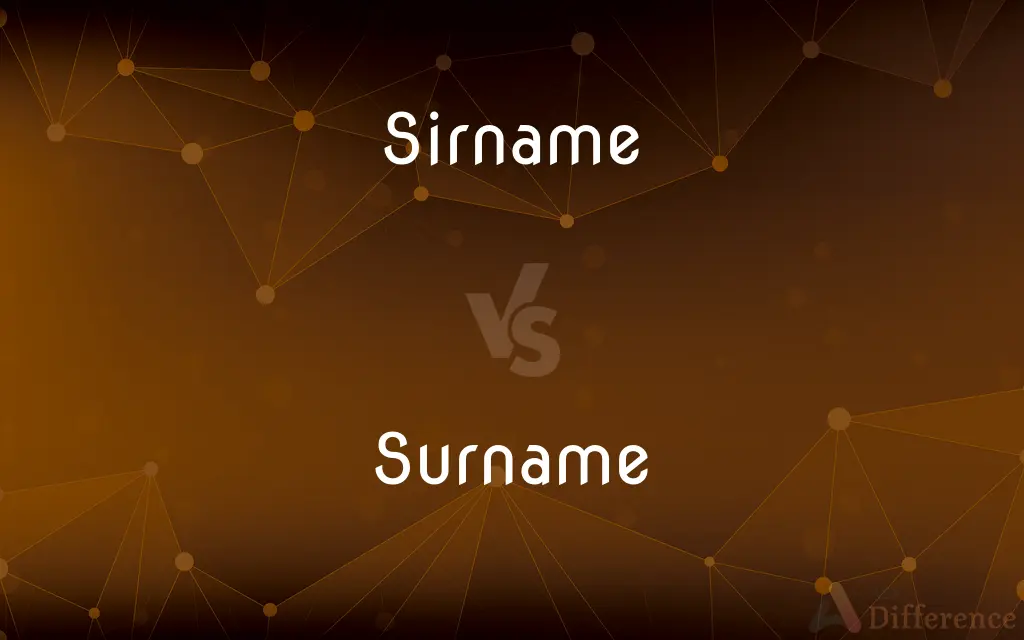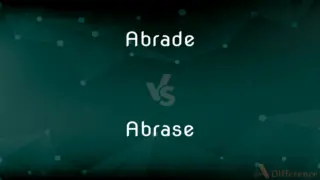Sirname vs. Surname — Which is Correct Spelling?
Edited by Urooj Arif — By Sumaia Saeed — Updated on April 23, 2024
Sirname is the incorrect spelling of surname, which refers to a person's family name or last name.

Table of Contents
Which is correct: Sirname or Surname
How to spell Surname?

Sirname
Incorrect Spelling

Surname
Correct Spelling
ADVERTISEMENT
Key Differences
Think of surname as the "name" shared by your "sir" or family.
The "sur" in surname sounds like "sir," helping to link it to family, as many associate "sir" with respect or formality.
Remember, surname contains "name," clearly pointing to its function as a type of name.
How Do You Spell Surname Correctly?
Incorrect: What is your sirname?
Correct: What is your surname?
Incorrect: His sirname is often misspelled.
Correct: His surname is often misspelled.
ADVERTISEMENT
Incorrect: She didn't know his sirname until they were formally introduced.
Correct: She didn't know his surname until they were formally introduced.
Incorrect: Can you check the reservation under my sirname?
Correct: Can you check the reservation under my surname?
Incorrect: They kept her mother's sirname as their middle name.
Correct: They kept her mother's surname as their middle name.
Surname Definitions
Part of a person's name that indicates family lineage.
His surname reveals his Scottish heritage.
A name added to a person's first name, also known as a last name.
Everyone in the class shared the same surname, Smith.
(obsolete) An additional name given to a person, place, or thing; a byname or nickname.
The last name of a person, used for formal and official purposes.
Please enter your surname on the form below.
Used in formal contexts to identify individuals.
The list was organized by surname to facilitate sorting.
In some cultures, a surname, family name, or last name is the portion of one's personal name that indicates their family, tribe or community.Practices vary by culture. The family name may be placed at either the start of a person's full name, as the forename, or at the end; the number of surnames given to an individual also varies.
A name shared in common to identify the members of a family, as distinguished from each member's given name. Also called family name, last name.
A nickname or epithet added to a person's name.
To give a surname to.
(obsolete) An additional name, particularly those derived from a birthplace, quality, or achievement; an epithet.
The name a person shares with other members of that person's family, distinguished from that person's given name or names; a family name.
James is my first name, and Smith is my surname.
(Classical studies) The cognomen of Roman names.
A clan.
(transitive) To give a surname to.
(transitive) To call by a surname.
A name or appellation which is added to, or over and above, the baptismal or Christian name, and becomes a family name.
An appellation added to the original name; an agnomen.
To name or call by an appellation added to the original name; to give a surname to.
Another shall subscribe with his hand unto the Lord, and surname himself by the name of Israel.
And Simon he surnamed Peter.
The name used to identify the members of a family (as distinguished from each member's given name)
A family name passed down through generations.
Her surname is the same as her great-grandmother's.
Surname Meaning in a Sentence
They share a common surname but are not related.
She wrote her surname on the top of the exam paper.
She decided to hyphenate her surname after marriage.
His surname is often mispronounced.
The surname "Smith" is very common in England.
He researched the origin of his surname.
Can you spell your surname for me?
Your surname goes first in this form.
The artist signs her works with her surname only.
Her surname is different from her siblings due to a clerical error.
The badge displays his surname prominently.
She kept her maiden surname professionally.
The database sorts all entries by surname.
He has a unique surname that stands out in any list.
Surname Idioms & Phrases
Share a surname
To have the same family name as someone else.
It turned out they shared a surname and were distant relatives.
Change one's surname
To legally change the family name.
She changed her surname after the marriage.
By surname
Identifying or sorting people by their family names.
The conference badges were organized by surname.
Surname pride
A sense of pride associated with one's family name.
He carries a strong sense of surname pride, honoring his ancestors.
Surname basis
Dealing with people according to their family names.
The old school managed students on a surname basis.
Carry the surname
To bear the family name, especially with dignity or pride.
He carries the surname of a long line of distinguished scholars.
Surname history
The historical background and lineage of a family name.
They explored their surname history through genealogical research.
Keep one's surname
To retain one’s family name after an event like marriage.
She chose to keep her surname to maintain her professional identity.
Make a name for one's surname
To bring fame or notoriety to one's family name.
She made a name for her surname with her groundbreaking research.
Under one's surname
Registered or listed under a family name.
The reservation is under my surname, Johnson.
Common Curiosities
How many syllables are in surname?
There are two syllables in "surname."
What is a stressed syllable in surname?
The first syllable, "sur," is stressed in "surname."
How do we divide surname into syllables?
Surname is divided into syllables as sur-name.
Why is it called surname?
The term "surname" comes from the French "surnom," meaning "additional name," used to distinguish between individuals with the same first name.
How is surname used in a sentence?
e.g., Please write your full surname in the application form.
What is the verb form of surname?
Surname does not have a verb form; it is a noun.
What is the pronunciation of surname?
Surname is pronounced as /ˈsɜrˌneɪm/.
What is the root word of surname?
The root of "surname" is the Middle French "surnom."
What is the singular form of surname?
Surname is used the same way in both singular and plural; it is "surname."
What is the plural form of surname?
The plural form is "surnames."
Is surname an abstract noun?
No, surname is a concrete noun referring to a specific type of name.
What part of speech is surname?
Surname is a noun.
What is another term for surname?
Another term for "surname" is "family name."
What is the opposite of surname?
There isn't a direct opposite of "surname," but "first name" or "given name" contrasts as it refers to the personal, rather than family, name.
Is surname an adverb?
No, surname is not an adverb.
Is the word surname imperative?
No, "surname" is a noun and cannot be imperative.
Is the word surname Gerund?
No, "surname" is a noun and not a gerund.
Which determiner is used with surname?
Determiners such as "the," "a," and "your" can be used with "surname."
Which vowel is used before surname?
Typically, "a" is used, as in "a surname."
Is surname a countable noun?
Yes, surname is a countable noun.
Which preposition is used with surname?
Common prepositions used with "surname" include "under" and "by," as in "listed under the surname."
Which article is used with surname?
The definite article "the" or indefinite "a" can be used, depending on the context.
Is surname a collective noun?
No, surname is not a collective noun; it refers individually to a person’s family name.
Is the surname term a metaphor?
No, "surname" is used literally to refer to a person's family name.
Is surname a noun or adjective?
Surname is a noun.
Is surname a negative or positive word?
Surname is neutral; it carries no inherent positive or negative connotation.
Is surname a vowel or consonant?
Surname starts with a consonant sound.
Is the word “surname” a Direct object or an Indirect object?
Surname can be a direct object in a sentence, e.g., "He changed his surname."
Which conjunction is used with surname?
Conjunctions like "and" and "or" can be used, especially when listing multiple surnames.
Share Your Discovery

Previous Comparison
Abrade vs. Abrase
Next Comparison
Gnaw vs. KnawAuthor Spotlight
Written by
Sumaia SaeedEdited by
Urooj ArifUrooj is a skilled content writer at Ask Difference, known for her exceptional ability to simplify complex topics into engaging and informative content. With a passion for research and a flair for clear, concise writing, she consistently delivers articles that resonate with our diverse audience.











































